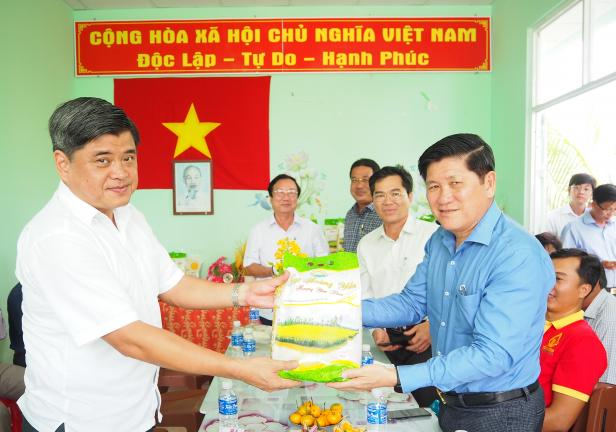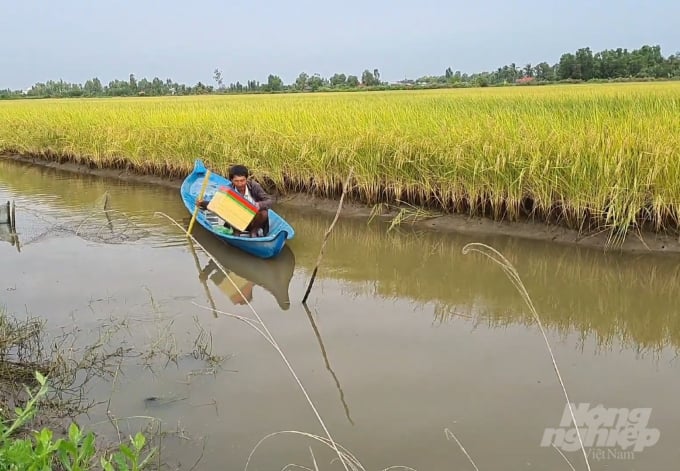May 29, 2025 | 18:32 GMT +7
May 29, 2025 | 18:32 GMT +7
Hotline: 0913.378.918
May 29, 2025 | 18:32 GMT +7
Hotline: 0913.378.918

Deputy Minister of Agriculture and Rural Development Tran Thanh Nam leads a delegation to work at the Tri Luc Rice - Shrimp Service Cooperative in Ca Mau province’s Tri Luc Commune, Thoi Binh District. Photo: Trong Linh.
A delegation from the Ministry of Agriculture and Rural Development, led by Deputy Minister Tran Thanh Nam, on April 6 visited the organic rice-shrimp farm - a new production model at the Tri Luc Rice-Shrimp Cooperative in Village 5 of Tri Luc Commune (Thoi Binh district, Ca Mau province).
The Tri Luc Rice - Shrimp Production Service Cooperative currently has 11 members with an authorized capital of VND150 million voluntarily contributed by the members each of whom gives about VND15-20 million. Currently, the cooperative owns an area of nearly 750 hectares for safe rice-shrimp production. Its members are following a clean production process to ensure a parallel healthy growth for the shrimps and rice without using chemicals or chemical fertilizers. This aims to create clean, quality and standard rice sources for the markets.
Annually, the cooperative supplies about 5-19 tons of rice to the market at a rather high price of VND 25,000-30,000/kg. Its rice products are very popular among customers inside and outside the province.
A delegation from the World Wide Fund for Nature of Vietnam (WWFVN) an international organization for nature conservation in Vietnam, recently also visited and conducted research at the co-opeartive. They could have selected 50 hectares for the research pilot of a model on improving the technology in building shrimp - rice sustainable chains with the aim to raise the value of shrimp and rice there.
Mr. Le Van Mua, Director of Tri Luc Rice - Shrimp Production Service Cooperative, said: “Local people have seen the profits when joining the cooperative with each kilogram of rice sold to the market at a price nearly twice higher compared to those products of rice specializing cultivation areas. By using organic fertilizers and organic pesticides, the shrimp also develops well and sustainably, so people are very interested in the cooperative's organic rice-shrimp production model.”

The current organic agricultural production is offering both a high economic value and friendly environment. Photo: Trong Linh.
After the harvested crop 2019-2020, the cooperative sold rice to the trading companies and the members themselves. At the same time, it decided to keep back 17 tons of rice for milling, packaging, and branding the Tri Luc organic rice.
“Then, the products are marketing in many other markets at a price from VND 27,000-30,000/kg. Up to now, the cooperative has sold many tons of clean rice, winning the favor of customers, contributing to improving the reputation of local specialty products. This is also a premise for Tri Luc organic clean rice brand to join the One Product Per Commune (OCOP) program,” said Mr. Mua.
Deputy Minister Tran Thanh Nam said a survey in processes from technical application to harvesting, as well as in product consumption of Tri Luc Rice - Shrimp Service Cooperative shows that the current orientation towards an organic agriculture production has brought in a very high economic value at the same with a friendly environment, very appropriate for human health.
This model is very effective and can help farmers get rich, according to the Deputy Minister.
He affirmed Ca Mau as one of the regions with natural ecological conditions, soil and water resources favorable for developing organic agricultural production. “This is a large advantage that many other areas do not have or they have to pass through a long transition from chemical to organic uses,” said Deputy Minister Tran Thanh Nam.

(VAN) FAO’s Director-General addresses the 5th Baghdad International Water Conference.
/2025/05/26/1716-4-nongnghiep-191706.jpg)
(VAN) Chain linkages, technological innovation, and raw material zoning are three strategic pillars for the coconut industry to strongly develop and elevate its position on the global agricultural map.
![Advanced mariculture – an inevitable trend: [4] Accompanied by scientists](https://t.ex-cdn.com/nongnghiepmoitruong.vn/608w/files/sohk/2025/05/13/1941-pgsts-vo-van-nha-140958_717.jpg)
(VAN) According to Assoc. Prof. Dr. Vo Van Nha, Director of the RIA III, the development of advanced offshore mariculture is no longer an option but an essential path for Vietnam’s fisheries sector.

(VAN) Vietnam is intensifying the development of mollusk farming areas that meet international standards, aiming for sustainable growth and enhancing its export position in the global seafood market.
![Advanced mariculture – an inevitable trend: [3] Policy-driven momentum](https://t.ex-cdn.com/nongnghiepmoitruong.vn/608w/files/doanhtq/2025/05/21/0104-0616-0348-nuoi-bien-170339_789.jpg)
(VAN) To ensure the success of offshore mariculture that uses advanced technologies, it is essential to establish supportive policies that inspire both individuals and enterprises to invest with confidence.
![Advanced mariculture – an inevitable trend: [2] Outstanding results](https://t.ex-cdn.com/nongnghiepmoitruong.vn/608w/files/sohk/2025/05/12/4632-4136-nuoi-bien-11-164117_819.jpg)
(VAN) Pilot models of high-tech offshore mariculture in Vietnam, particularly in the South Central Coast region, have demonstrated exceptional economic returns and sustainability, setting a new direction for the country’s aquaculture industry.
![Advanced mariculture – an inevitable trend: [1] Moving offshore](https://t.ex-cdn.com/nongnghiepmoitruong.vn/608w/files/phucpm/2025/05/18/0252-2436-nuoi-bien-6-162148_783.jpg)
(VAN) Mariculture using advanced technology and moving offshore is an inevitable trend, as nearshore areas increasingly reveal limitations.